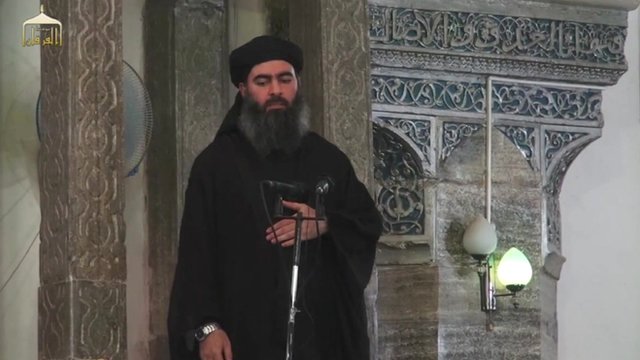Abu Bakr Al-Baghdadi’ aka Caliph Ibrahim’s first public appearance in Mosul, Iraq’s second city, contrasts with former al-Qaeda chief Osama bin Laden, who hid his location when recording messages. Wearing a black turban and robe, al-Baghdadi – who claims to be descended from the Prophet Mohammed – is filmed slowly climbing stairs to a balcony, above which flies the black flag of the Islamic State.
 In the video “Caliph Ibrahim, Emir of the faithful in the Islamic State,” urged urged the world’s Muslims to join the cause.
In the video “Caliph Ibrahim, Emir of the faithful in the Islamic State,” urged urged the world’s Muslims to join the cause.
Under his direction, the Islamic world would be returned to “dignity, might, rights and leadership”, the self-anointed “Caliph Ibrahim” announced.
Praising Sunni jihadists who have slaughtered thousands of rival Shia Muslims, beheading some, he called for the fight to continue and went on: “God has granted your brothers the Mujahideen victory and conquest after years of patience.
“The establishment of a caliphate is an obligation. The religion cannot be in place unless the sharia (law) is established. I am your leader, though I am not the best of you, so if you see that I am right, support me, and if you see that I am wrong, advise me.”
The video was released on a website known to be used by ISIS. Sources in Baghdad said it was genuine.
It spread rapidly across jihadi websites after it was posted online. Many militants took to social media to praise al-Baghdadi’s message and issue further threats. One, Abu Bakr al-Janab, wrote: “He gave the most honest speech and promises.”
But prominent writers condemn the Caliph Ibrahim’s move. Mehdi Hassan, London based political director of the Huffington Post UK, in his column wrote: The era of Muslim caliphates came to a close in 1924, when the Ottomans were toppled in Turkey. Over the past nine decades, several Muslim leaders have tried to set themselves up as caliph-type figures (think of Ayatollah Khomeini in Iran or the Taliban’s Mullah Omar in Afghanistan). Yet, crucially, none of them has tried to claim political authority over Muslims outside the borders of his respective state. Al-Baghdadi wants Muslims across the world to fall at his feet.
The eminent journalist said: There are four points worth considering in any discussion of Isis or its “caliphate”. First, there is nothing Islamic about a state. I have argued before that: “There is not a shred of theological, historical or empirical evidence to support the existence of such an entity.” Yes, we Muslims have a romanticised view of Medina, under the rule of the Prophet Muhammad between 622 and 632AD, but it had none of the trappings of a modern state – no fixed borders, no standing army, no civil servants – and was led by a divinely appointed prophet of God. Unless the shadowy al-Baghdadi plans to declare his prophethood, too, the Medina example is irrelevant.
Incidentally, the caliphate (from the Arabic khilafah, or “succession”) that came after Muhammad was plagued by intrigue, division and bloodshed. Three of the first four “rightly guided caliphs” were assassinated. By the 10th and 11th Centuries, there were three different caliphates – Umayyad, Abbasid and Fatimid – which were constantly at war with one another. Not quite the golden age of the Islamist imagination.
British Muslims aren’t keen, either. As many as 500 British Muslims are believed to have gone to fight for Isis, which is 500 too many but less than 0.02% of the UK’s 2.7million Muslims. A recent YouGov poll found that Muslims as a group are more patriotic Britons than Scots.
…Politicised Islam has proved to be a failure. Violent Islamists have discovered, after the shedding of much blood, that you cannot Islamise a society by force – whether in Afghanistan, Gaza, Egypt or Iran. Rhetoric is easy; running public services and state institutions much harder. The hand-choppers and throat-slitters of Isis, Boko Haram, al-Shabab and the rest have no political programme, no blueprint for government. Theirs is a hate-filled ideology, built on a cult of victimhood and sustained by horrific violence.